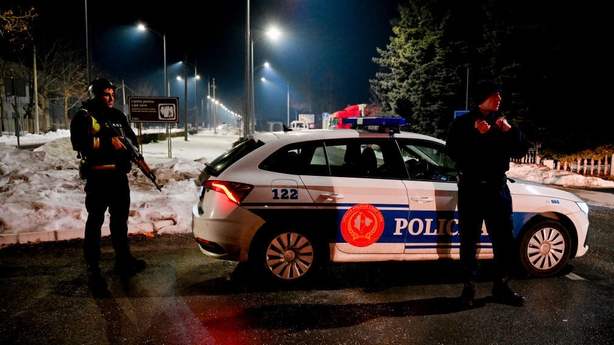Montenegro has begun three days of national mourning after a gunman opened fire at a village restaurant before a series of shootings, killing 12 people including two children.
"Twelve people were killed, of whom two were children," prosecutor Andrijana Nastic told reporters in the southern town of Cetinje, raising the previous toll of at least ten from last night's attack.
The 45-year-old gunman died after from self-inflicted injuries when he was surrounded after an hours-long manhunt, police said this morning.
The victims were killed at five different locations, with the first four in the restaurant, the prosecutor said.
Police said the two killed children were aged 10 and 13.
We need your consent to load this rte-player contentWe use rte-player to manage extra content that can set cookies on your device and collect data about your activity. Please review their details and accept them to load the content.Manage Preferences
Four people were also seriously injured and transported to a hospital in the capital, Podgorica.
This morning, three remained in critical condition including one, who sustained a head injury, in extremely critical condition, hospital head Aleksandar Radovic told reporters.
The streets of Cetinje and Bajice were deserted this morning, and a police patrol was stationed in front of the gunman's house at the entry to the village, according to an AFP photographer.
'Terrible tragedy' - Montenegro PM
"A terrible tragedy has struck all of us in Cetinje, in the village of Bajice," Prime Minister Milojko Spajic told state broadcaster RTCG.
Police chief Lazar Scepanovic said the suspect "had consumed alcoholic beverages all day" before an altercation between him and another restaurant guest.
He then went home, where he took a weapon and then returned to kill four people at the restaurant before moving on to the other locations, Mr Scepanovic said.
Police were initially wrongly informed that the restaurant was located in a nearby village where they first rushed, he added.
Police earlier had ruled out any "showdown between organised criminal groups", adding that the firearm was owned illegally.

Mr Spajic said the shootings were a "restaurant fight" gone wrong and that he would be tightening the country's criteria for firearms possession.
"This is a tragedy after which we must ask ourselves who should be allowed to possess firearms in Montenegro," he said.
The country's National Security Council is to meet tomorrow to review "key challenges in the detection and seizure of illegal weapons" as well as the recruitment of additional police officers, a government statement said.
Mr Spajic had posted earlier on X that "all options, including a complete ban on the possession of weapons", would be considered.
Montenegro president 'shocked and shaken'
President Jakov Milatovic said he was "shocked and shaken by this tragedy that has cast a shadow over our Cetinje".
According to the Small Arms Survey, a Swiss research program, there are approximately 245,000 firearms in circulation in Montenegro.
But mass shootings are rare in the Balkan nation of just over 620,000 people.
In 2022, a man murdered ten Cetinje residents, including two children, in broad daylight before being killed, in one of the deadliest such incidents to rock the country.
Cetinje, with the population of around 13,000 people, is the site of the former royal capital and sits in a mountainous valley that has largely stagnated economically.
The area and its surroundings are strongholds of organised criminal groups, and clashes erupt sporadically between rival mafia clans.
In June, two people were killed in a blast at a Cetinje sports centre, an attack linked to organised crime.
Organised crime and corruption remain two major issues plaguing Montenegro that authorities have pledged to tackle in its bid to join the European Union.

